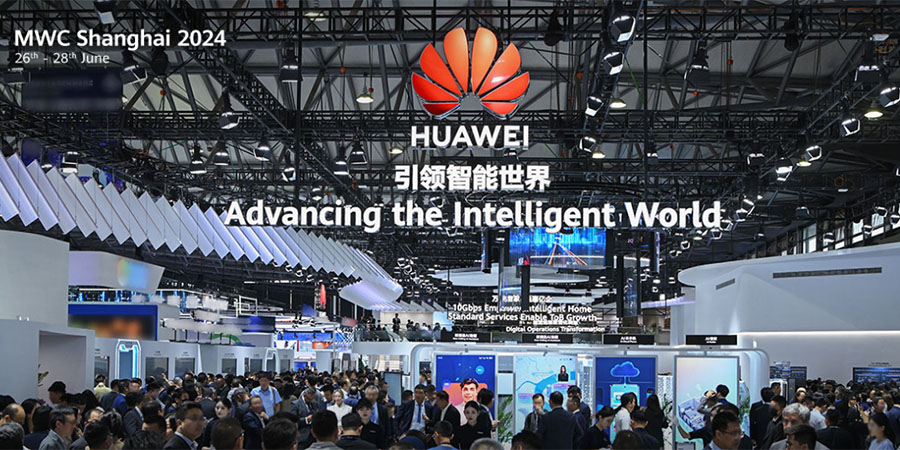Moderated by the GSMA, regulators and operators from the Middle East, North Africa, and Central Asia gathered at a roundtable during MWC Shanghai 2024 to discuss the ‘Middle East and Central Asia ICT Policy and Governance Forum.’ Senior officials from Huawei and the China Academy of Information and Communications Technology (CAICT) discussed industry policies, best practices, and key industry trends.
Themed ‘Driving Policy and Innovation to Shape Our Digital Future,’ the forum explored the importance of spectrum and the need for optical and datacom policy planning and outlined how carriers, enterprises, oversight agencies and regulators can enhance mobile security capabilities and provide guidance for risk management strategies. The gathering also highlighted the adoption of the GSMA's Network Equipment Security Assurance Scheme (NESAS) and Mobile Cybersecurity Knowledge Base (MCKB).
Jawad Jalal Abbassi, Head of MENA at GSMA, who moderated the roundtable discussion, said, "The GSMA regularly explores a range of security considerations including secure by design, 5G deployment models and security activities. Good security practices and policies by industry suppliers are essential. The mobile ecosystem should empower advancing positive policy and spectrum outcomes, driving digital innovation to reduce inequalities in our world and tackling today's biggest societal challenges."
At the forum, Jeff Wang, President of the Public Affairs and Communications Department, Huawei, added, "To fully reap digital dividends, we need to pay more attention to enhancing connectivity, embracing digital application and empowering digital talent."
Focus on Policy Implementation and Cybersecurity
The forum featured two sessions and explored ICT policy implementation and cybersecurity. The ICT policy implementation session covered several key topics: spectrum planning for 5G and 5G-A networks, the use of universal service funds (USF) and policies to enhance mobile connectivity in rural areas, and strengthening the regulation of both mobile and fixed networks to support the foundations of the digital economy. The session provided recommendations for various countries, such as the UAE, Saudi Arabia, Pakistan, and Iraq, based on their specific needs and achievements in these areas.
More than 50 countries globally are investing in super-fast optical fiber networks and Giga broadband to handle the network demands of future technologies like AR/VR and high-definition streaming. This digital upgrade is crucial to support the development of the regional ICT industry while ensuring a smooth user experience. Notably, operators in the MENA region need to improve their optical fiber networks to ensure homes and offices possess the speed and stability for these advancements.
The cybersecurity session focused on building a Telecom-Information Security Management System (T-ISMS) to manage the current cybersecurity issues telcos are facing globally. The session covered topics such as the roles and responsibilities of various stakeholders in telecom cybersecurity, implementing a comprehensive telecom cybersecurity strategy through collaboration between stakeholders, and ways regulatory authorities can promote telecom cybersecurity.
Robust national network development strategies, aligned with visions and key industries, are crucial for MENA. The growing demand for advanced services necessitates network upgrades. These upgrades are vital for ambitious projects like Saudi Arabia's 10 Gbps Society. Supportive policies from governments will incentivize carriers and enterprises to invest in infrastructure optimization.
Contributing to the session, Lin Yanqing, Principal Consultant, Industry Policy Public & Government Affairs, Huawei Technologies and Aloysius Cheang, Chief Security Officer, Huawei Middle East and Central Asia, reiterated that Huawei has taken a proactive approach to telecom cybersecurity standardization.
Cheang said, “As we chart our journey into the digital future, cybersecurity must safeguard the trust and resiliency of the network, the cyberspace, and the metaverse where data is the new oil as organizations' assets are increasingly digitalized or virtualized. We must ensure that we continue to embrace the culture of openness, transparency, and collaboration. Cybersecurity is a team sport, and together with GSMA, we can leverage their good work, such as NESAS and MCKB, that will lay the foundation to secure broadband, 5G, 5G-A, and beyond.”
The executives explained that Huawei works with the GSMA, the ITU, the 3GPP, security organizations and companies, and others to ensure the security of its customers and promote the healthy development of the mobile ecosystem. Huawei has passed NESAS/SCAS 2.0 evaluations for its 5G base station and NESAS audits for its RAN and core network, demonstrating the company's regulatory commitment to cybersecurity.










